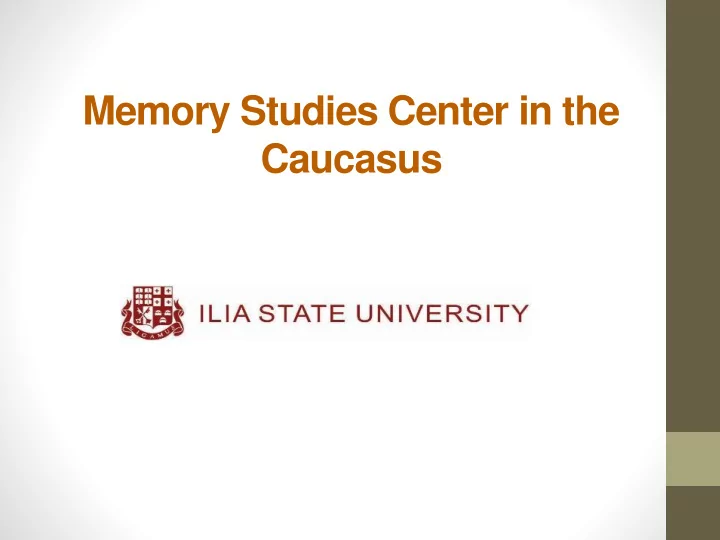

Memory Studies Center in the Caucasus
Why Does Memory matter in the Caucasus? • The Caucasus - meeting point, crossroad or borderland of different cultures, religion and ethnicities • Coexistence of different, sharply divided and contested mnemonic communities • Great impact of interpretation of the past on cultural and political processes in the region
Areas of research A wide range of problems but special attention to Georgia and the Caucasus: • Different levels of memory and plural memories: memories of family, women, social groups, ethnicities, etc. • Modes of remembering, narrating and transmitting the past : oral history, artifacts, textbooks, sites of memory, etc • Memory and Identity: using the past and history to define identities in different levels; cultural politics and “invention of tradition”; myth making and nation -building; national memory projects • Soviet and post-Soviet memory politics : totalitarianism and imperial legacies
• Memory, power and political legitimation • Memory and media: media as a tool of and a strategy for memory politics and propaganda • Politics of memory and conflicting identities: “war of historians”; ethno -histories; the past and ethnic mobilization • Memory and Trauma • Collective amnesia : collective amnesia as the act of forgetting and a way toward reaching social cohesion? • Memory in peace building and reconciliation process
Some possible forms of regional and international collaboration • Regional and international conferences, workshops, round tables and meetings • Publications • Online resources – a website/database of information and resources on memory-related research, projects, and centers around the world • Teaching and research collaborations with regional and international scholars
Some results
Memory Studies Center in the Caucasus Research project Trapped in the Past: Silenced Voices of Georgian IDPs and Dilemmas of Social Integration Research team Malkhaz Toria, Nino Pirtskhalava, Elene Kekelia, Konstantine Ladaria 2016
Research problem Culturally and socially driven reasons which: • Define hardship of IDPs from Abkhazia and South-Ossetia regions of Georgia living in collective centers throughout the country • Silence and weakly represent IDPs’ claims • Hinder IDPs’ social integration in mainstream Georgian society and define their marginal position Key topics • Identity of feebleness • Stigma and lack of empathy from surrounding society • Role of media in cultivating negative images about IDPs • Problems of communications or miscommunications between IDPs and the Georgian state • Nostalgic memories of homeland and constant longings to go back to place of origin
Fieldwork IDP collective settlements in Samegrelo (Western Georgia) and Shida Kartli (Eastern Georgia) regions August 24-26, 2015 Interviews with 28 IDPs from Abkhazia region in collective settlements in Zugdidi city and in a village Anaklia (within Zugdidi district) in Samegrelo region. September 12 and October 23, 2015 Interviews with 31 IDPs from South Ossetia in Tsminda Tskali collective settlement in Gori city and Tserovani settlement in Mtksketa district (Eastern Georgia).
Focus group meeting in February, 2016 Invited participants - representatives of governmental agencies and NGOs working on IDPs’ problems: • Ministry of Internally Displaced Persons from the Occupied Territories, Accommodation and Refugees of Georgia (MRA) • State Ministry for Reconciliation and Civic Equality (SMR) • The government of Autonomies republic of Abkhazia • Consent – IDP women association • Synergy IDP Network, “Post Factum” – association of journalists • Regional network of peace and reintegration • Studio Re (Movie & Television Studio)
Policy Brief The other side of integration: stigma as the reason of hardship (the case of Georgian IDPs) Elaboration on some possible solutions, which could facilitate the integration process and how IDPs should be treated outside established narrative of lost homeland, constant grief, and economic and social problems
Recommended practical measures A) Establishing the institute of IDP community representative (foreman) as an official position with salary, list of responsibilities towards entire community, and an action plan. B) Popular media should not ‘cultivate’ an negative image stereotypes about IDPs which is linked exclusively to conflicts. C) Facilitating creation of neutral and balanced academic discourse about IDPs and their traumatic experience, also about conflict regions generally in educational institutions. D) Media, educational institutions, governmental and NGOs need to focus on positive examples of Georgian-Abkhazian and Georgian-Ossetian peaceful coexistence. However, it does not imply ignoring the history of armed conflicts and covering up the past events. These conflicts should be appraised as tragic mistakes.
Policy brief launch event April 12, 2016
Radio Free Georgia -An Hour of Liberty with Gogi Gvakharia April 12, 2016
Op-ed publication on "Tabula" analitical journal
Publication in international and peer-reviewed academic journal
International conference Memory and Identity in Post-Soviet Space: Georgia and the Caucasus in a Broader Eastern European Context 1-3 June 2016 Ilia State University (Tbilisi, Georgia) Partner institutions: Academic Swiss Caucasus Net (ASCN) European Network Remembrance and Solidarity (ENRS) Konrad-Adenauer-Stiftung (KAS)
Main focus of the conference • Politics of memory in historical perspectives: historical forms of memory policy in Georgia and the Caucasus • Soviet and post-Soviet memory politics in the framework of totalitarianism and imperial legacies. • Sites and realms of memory in Georgia and the Caucasus • Collective memory and collective amnesia: collective amnesia as the act of forgetting and a way toward reaching social cohesion? • Memory in peacebuilding and reconciliation process.
Recommend
More recommend